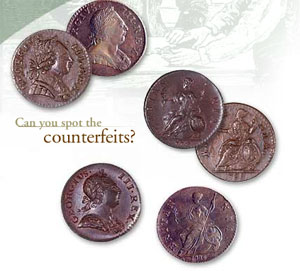Coin of the Realm

We use the word bogus to mean spurious, fake, sham, insincere. It became a fad word thanks to Wayne’s World and Bill and Ted’s Bogus Journey, among others.
There is some confusion about the word’s origin. The Oxford English Dictionary gives a clear citation from 1827, but it seems to have been in American use a few decades earlier. In any case, it referred to counterfeiting coins.
The 1827 citation comes from the Painesville, Ohio, Telegraph. As a strange-looking apparatus used by counterfeiters was confiscated, a man in the crowd that had gathered called out, “It’s a bogus!” So the counterfeiting device was a bogus, and it produced bogus coins.
The computer crowd ran with the word in the 1960s, producing a number of satirical words. Quantum bogodynamics was the name given to the humorous theory. The idea was that trouble-making particles called bogons could cause computers to break down and humans to behave like idiots. Used car salesmen, TV evangelists, and suits were prime sources of bogons, and high levels of bogosity (measured by bogometers) were to be avoided at all costs. Autobogophobia reigned at the time: hackers feared becoming bogotified.


Comments